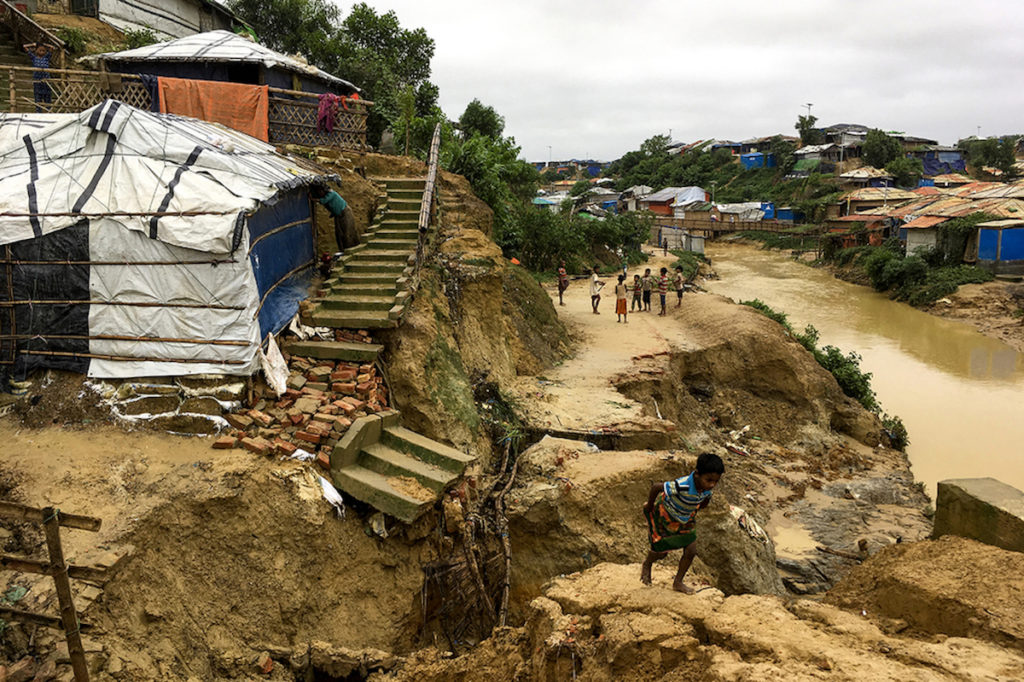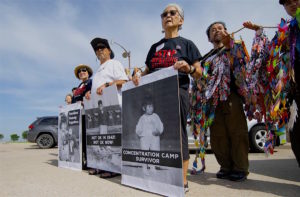
Rohingya children in a landslide area at Balukhali refugee camp on 7 July 2019 (from The New Humanitarian)
Rohingya Camps Face the Monsoon
The monsoon season in South and Southeast Asia has arrived. Al-Jazeera wrote on July 15:
In the overcrowded refugee camps in Bangladesh’s Cox’s Bazar district – home to nearly one million Rohingya who have fled a military crackdown in Myanmar—nearly 5,000 tarpaulin and bamboo homes were destroyed after heavy rains triggered mudslides on the hill slopes, according to a spokeswoman for the International Organisation for Migration.
Thousands of Rohingya have been left without shelter because of the heavy rains. …”It’s tough to go to food distribution centres by wading through a swamp of mud,” Nurun Jan, a Rohingya refugee, told AFP news agency. “Rains and gusty wind have made our life miserable.”
Refugees also described a shortage of drinking water and a looming health crisis due to flooded toilets, which foster disease outbreaks.
The monsoon has hit particularly hard this year. Some of the camps received twenty inches of rain in a three-day period last week. The photo above is of the camp I visited in March of 2018. The narrow trench I saw running through the village is now a rushing stream. As the rains continue, more than 10,000 risk losing the fragile tents and structures they call home in the Rohingyas’ stateless twilight zone of exile.
Buddhist Humanitarian Project/Clear View Project is again asking you to support the Rohingya in what seems like an endless time of need. The political realities are suggesting that an honorable and legal repatriation to their lands in Myanmar is not coming soon. But the Rohingya and their international allies continue to press for their return with rights of protection and full citizenship. Until then, we must hold them in our hearts and share with them the bounty that has been given to us.
Click here to make a donation to Clear View Project’s Rohingya fund. We will ensure that the funds are distributed to where they are most needed.
Buddhist Response to the Immigration Crisis and White Supremacy
The refugee crisis in Myanmar and Bangladesh echoes similar crises across the globe: in Syria, Afghanistan, and South Sudan; and of course in Central American, with thousands seeking asylum in the United States. The causes are war, religious oppression, gang violence, climate change, and desperate poverty.
Whatever the cause, these are our brothers and sisters. In a very real sense these refugees are so much like our own grandparents and their families, many of whom fled these same conditions in Europe, Ireland, and Eastern Europe in the early days of the last century. Some of us grew up hearing these stories of flight and exile.
The shameful policies of the present U.S. administration—denying entry, denying asylum, separating parents and young children each into inhumane concentration camps, launching I.C.E. raids targeting whole communities. I don’t need to document this in detail, because newspapers, radio, and television inundate us with facts and images hour after hour.

Fort Sill protestors
Buddhists of all traditions are invited to join the memorial service and protest at Fort Sill, Oklahoma, on 20 July. The racist and violent history of Fort Sill has deep roots. Fort Sill was built in 1869 by General Phil Sheridan as the jumping off point for U.S. Army incursions in the Indian Wars. During World War 2 it was Japanese internment camp.
On 11 June the Department of Health and Human Services announced that up to 1,400 unaccompanied migrant children would be transferred from Texas to Fort Sill.
For information on the Fort Sill memorial and the unfolding campaign for immigrant rights see this article from Lion’s Roar.
It is clear to me that as a person of conscience and as a Buddhist, my concern and responsibility is for the well-being of all people, creatures, and lands. The intertwined crises of immigration, climate change, poverty, and war cannot really be teased apart. If you would like to join people of faith in addressing these challenges, please write me at: asenauke@gmail.com
And give what you can to Clear View. We will use your gift wisely and keep you informed. Click here to donate to our immigration crisis fund.
Peace,
Hozan Alan Senauke